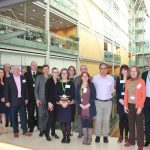This week, UNESCO meets to discuss its global Open Science project, and PLOS is partnering with TCC Africa. We learn that easy-to-read scientific articles leave a positive impression and that published articles are only marginally better quality than preprints. We also hear from a disability activist in academia, a library director in Poland and the creators of a peer review learning hub. Finally, we discuss global sharing of earth observation data.
Open Science: sharing research in a post-COVID world via Associated Press News | 2-minute read
Experts at UNESCO met this week to discuss new global guidelines on how scientific information is produced, shared and communicated across borders. The project, Open Science, aims to implement the guidelines by the end of 2021, facilitating the systematic sharing of data, software and research, including resources related to COVID-19. The Open Science project ties in with recent calls to relax patents for COVID-19 vaccines, a debate currently under discussion at the World Trade Organization.
PLOS partners with TCC Africa via The Official PLOS Blog | 2-minute read
Following the announcement of five new open access journals, PLOS is teaming up with the Training Centre in Communication (TCC Africa). TCC Africa provides training in researchers’ visibility and communication and, like PLOS, promotes open science. The partnership aims to ensure that African research is represented in PLOS’s journals and that open science works for local communities in Africa.
Keep language plain and simple via Inside Higher Ed | 9-minute read
Academic papers can be wordy and jargon heavy, but a new study suggests that hard-to-read articles may actually get cited less often than clearly written articles. Marketing professors were given marketing articles to read that had been pre-rated to measure abstract, technical and passive writing. Clearly written articles left the professors with a more positive impression of both the author and the research than hard-to-read articles. The authors of the study aim to encourage the next generation of researchers to avoid abstract, technical and passive writing, and have developed a free Writing Clarity Calculator.
Is a preprint ever as good as the finished article? via The Publication Plan | 1-minute read
Rapid dissemination of research via preprint servers has become increasingly vital since the start of the pandemic. However, as preprint papers are not yet peer reviewed, there are concerns over their scientific rigour and validity. A study comparing articles published in peer-reviewed journals and preprints obtained from bioRχiv found that the difference in quality – assessed using the EQUATOR reporting guidelines – was marginal: peer-reviewed articles scored around 5% higher than preprints. The results are encouraging news for research accessibility and fast dissemination of data but do highlight the fact that the peer review process may be delivering only modest value.
Enabling open science to fight ableism via The Publication Plan | 20-minute read
In this interview, research fellow and disability activist Becca Wilson discusses the accessibility of clinical trials, medical information and academia. Clinical trials are often unlikely to include disabled people owing to strict eligibility criteria or inaccessibility, which may bias findings. However, open access publishing aids disabled people, who already face increased costs of living, and helps patient advocacy groups access the information they need. Becca Wilson also recommends that scientific research organizations should implement specific policies and awareness training covering disabilities.
Open access: a perspective from Poland via The Wiley Network | 10-minute read
In this interview, we hear from Anna Walek, Director of the Gdańsk University of Technology Library, who discusses the benefits and drawbacks of open access from a librarian’s perspective. A great proponent of open access, Anna admits that costs associated with open access often fall on library budgets. Misconceptions, current challenges and the position of open access in Poland are also considered.
Reviewing peer review skills via The Scholarly Kitchen | 7-minute read
Peer review can be challenging, particularly for early-stage researchers. In 2021, IOP Publishing (IOPP) launched a peer review e-learning hub and certification programme for physicists. In this interview, Laura Feetham of IOPP discusses peer review learning resources, which included spotting plagiarism and image manipulation, and the ethics surrounding the peer review process. Although the certification programme was developed for physicists, peer review competency is essential to all disciplines.
Making space open access via Space News | 6-minute read
Earth observation (EO) data is an invaluable resource for monitoring and managing climate change, maritime and agricultural activities, and human-made and natural disasters. This opinion piece argues that EO data should be open access to provide less developed areas lacking the tools for monitoring with the information needed for risk and disaster management. It is acknowledged that there are some hurdles to making all EO open access, such as security and defence concerns, but overzealous restrictions can limit international collaboration.
We at Open Pharma would like to continue to encourage all our readers to look after themselves and their community and to continue to follow advice from their country’s government and health organizations.
Coronavirus mental health and well-being resources:






